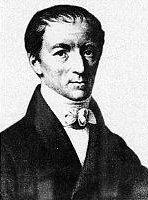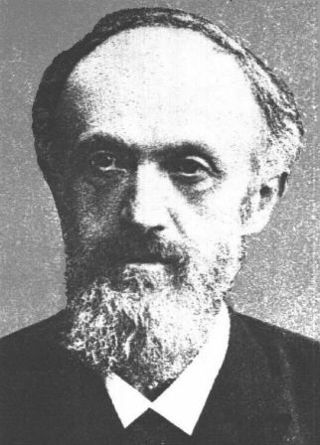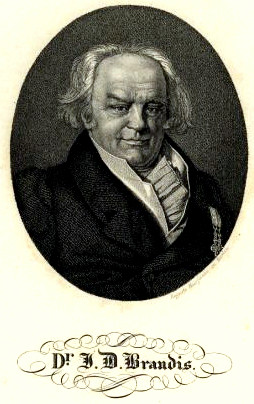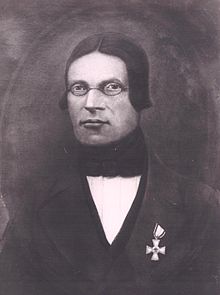
Justus Freiherr von Liebig was a German scientist who made major contributions to agricultural and biological chemistry, and is considered one of the principal founders of organic chemistry. As a professor at the University of Giessen, he devised the modern laboratory-oriented teaching method, and for such innovations, he is regarded as one of the greatest chemistry teachers of all time. He has been described as the "father of the fertilizer industry" for his emphasis on nitrogen and trace minerals as essential plant nutrients, and his formulation of the law of the minimum, which described how plant growth relied on the scarcest nutrient resource, rather than the total amount of resources available. He also developed a manufacturing process for beef extracts, and with his consent a company, called Liebig Extract of Meat Company, was founded to exploit the concept; it later introduced the Oxo brand beef bouillon cube. He popularized an earlier invention for condensing vapors, which came to be known as the Liebig condenser.

Christoph Martin Wieland was a German poet and writer. He is best-remembered for having written the first Bildungsroman, as well as the epic Oberon, which formed the basis for Carl Maria von Weber's opera of the same name. His thought was representative of the cosmopolitanism of the German Enlightenment, exemplified in his remark: "Only a true cosmopolitan can be a good citizen."

Christian Gottfried Ehrenberg was a German naturalist, zoologist, comparative anatomist, geologist, and microscopist. Ehrenberg was an evangelist and was considered to be one of the most famous and productive scientists of his time.

Gottfried Reinhold Treviranus was a German physician, naturalist, and proto-evolutionary biologist.

Karl Christian Friedrich Krause was a German philosopher whose doctrines became known as Krausism. Krausism, when considered in its totality as a complete, stand-alone philosophical system, had only a small following in Germany, France, and Belgium, in contradistinction to certain other philosophical systems that had a much larger following in Europe at that time. However, Krausism became very popular and influential in Restoration Spain not as a complete, comprehensive philosophical system per se, but as a broad cultural movement. In Spain, Krausism was known as "Krausismo", and Krausists were known as "Krausistas". Outside of Spain, the Spanish Krausist cultural movement was referred to as Spanish Krausism.

Carl Remigius Fresenius, was a German chemist, known for his studies in analytical chemistry.
Samuel Friedrich Nathaniel Ritter von Stein was a German entomologist. He was Professor at the Royal Saxon Academy of Forestry in Tharandt from 1850–55; and Professor, and later Rector, at the Charles University in Prague, from 1855–76. His scientific work focused on invertebrates, and mainly on Diptera.

Moritz Traube was a German chemist and universal private scholar.
Johann Heinrich Gottlob von Justi was one of the leading German political economists in the 18th century.

Friedrich Wilhelm Marpurg was a German music critic, music theorist and composer. He was friendly and active with many figures of the Enlightenment of the 18th century.

Lorenz von Westenrieder was a well-known author and historian in Bavaria and a critic of the Elector Karl Theordor and supporter of Maximilian IV Joseph. There are several memorials to him in Munich.
Karl Friedrich Eusebius Trahndorff was a German philosopher and theologian.

Julius Wilhelm Albert Wigand, known as Albert Wigand was a German botanist, pharmacologist and pharmacognostician. His is most well-known for being the director of the Alter Botanischer Garten Marburg from 1861 to 1886, and for his opposition to Charles Darwin and the theory of Evolution on religious grounds.

Johann Friedrich Georg Hartmann Mayer was a German Reformed pastor and agricultural reformer, who is considered one of the most important writers on agriculture of his time. He came to prominence through his efforts to promote agricultural reforms, especially with his 1769 publication with new regimes of crop rotation, and his 1773 textbook on rural householders and husbandry.

Harro Paul Harring was a German-Danish revolutionary and writer. Often identified as Danish, he was, more accurately, from North Frisia in the Duchy of Schleswig.

Felicjan Odrowąż Sypniewski, also known as Felicyan Sypniewski was a Polish naturalist, botanist, entomologist, malacologist, algologist and philosopher.
Heinrich Friedrich Franz Körte was a German natural and agricultural scientist, and for thirty years Professor of Natural Sciences at the Agricultural Academy in Möglin, which was founded by Albrecht Daniel Thaer.

Joachim Dietrich Brandis was a German-Danish physician.
Salomo Friedlaender was a German-Jewish philosopher, poet, satirist and author of grotesque and fantastic literature. He published his literary work under the pseudonym Mynona, which is the German word for "anonymous" spelled backward. He is known for his philosophical ideas on dualism drawing on Immanuel Kant, and his avant garde poetry and fiction. Almost none of his work has been translated into English.
Uwe Harten is a German musicologist, who works in Austria.














